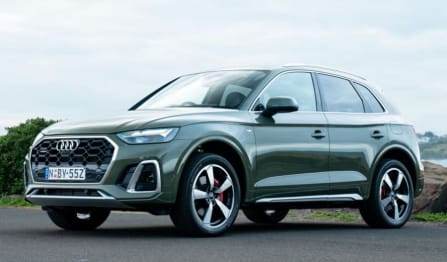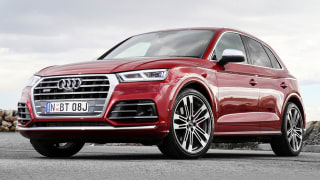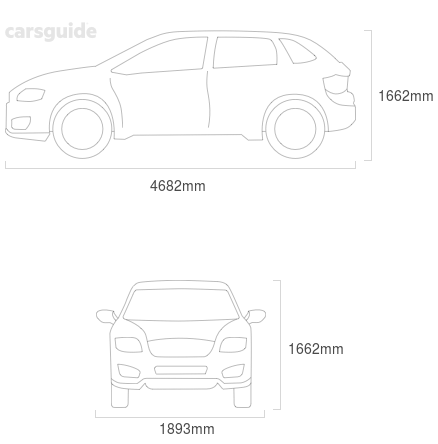
What's on this page
Audi Q5 2023
The 2023 Audi Q5 carries a braked towing capacity of up to 2000 Kg, but check to ensure this applies to the configuration you're considering.
Audi Q5 Reviews

Audi Q5 2024 review: 55 TFSI e quattro S line

Audi Q5 2022 review: 35 TDI

Audi Q5 Sportback and SQ5 Sportback 2022 review

Audi Q5 2021 review: 40 TDI

Audi Q5 2021 review: Sport snapshot

Audi Q5 2021 review

Audi Q5 2021 review: S-Line snapshot

Audi Q5 2020 review: 45 TFSI Sport

Audi Q5 2019 review: 50 TDI

Audi Q5 Sport petrol 2017 review

Audi Q5 Design 2017 review

Audi SQ5 2017 review: snapshot
Audi Q5 2023 Price and Specs
Pricing guides

| Audi Q5 Model | Body Type | Specs | Price from | Price to | |
|---|---|---|---|---|---|
| 35 TDI Dynamic Black | SUV | 2.0L Diesel 7 SP AUTO | $67,210 | $77,220 | |
| 35 TDI Mhev | SUV | 2.0L Diesel 7 SP AUTO | $64,020 | $73,590 | |
| 40 TDI Dynamic Black | SUV | 2.0L — 7 SP AUTO | $79,970 | $91,960 | |
| 40 TDI Quattro Mhev | SUV | 2.0L Hyb/Diesel 7 SP AUTO | $71,170 | $81,840 | |
Audi Q5 2023 Q&As
Check out real-world situations relating to the Audi Q5 here, particularly what our experts have to say about them.
-
Is it dangerous if the reductant heater in my 2013 Audi Q5 is broken?
The reductant heater on this car is a heating element that stops the AdBlue from freezing. According to most sources, the heater is only called into operate at ambient temperatures of minus-11 Celsius or lower. So, unless you're a regular at Australia's snowfields, your car will probably never need this function. But while the car may work perfectly without a functioning reductant heater, you might find that it's technically unroadworthy on the basis of its emissions systems (of which the AdBlue is a part) are not all working properly.
Most times, failures of this heater revolve around the electronics that control it, but when that happens, the computer will usually flash up a check-engine light to let you know there's something wrong. Without this light, I'm unsure why your mechanic would think there's a problem with the heater system.
Show more -
Can I put engine oil 5W40 in a 2016 Audi Q5?
The recommended engine oil for your car is actually a 5W30 fully-synthetic. That goes for either the petrol or diesel-engined version of the Q5.
Show more -
Audi Q5 Engine Oil: What Type & How to Change
The recommended Audi Q5 engine oil is a fully synthetic oil with a viscosity rating of 5W30. Regardless of what engine is fitted to your Audi Q5 oil type and grade remains the same from 2017 onwards, regardless of whether the car in question is fitted with the two-litre turbo-petrol, two-litre turbo-diesel or the three-litre V6 engine.
In older, simpler cars than the Q5, an oil change is as simple as opening the drain plug to remove the old oil, spinning on a replacement oil filter, replacing the plug and refilling the engine with oil.
But the complex specifications of the modern Audi line-up mean that there’s often a bit more to this critical maintenance job. For instance, some of the fasteners Audi uses in the engine bay might require specialised tools. There are also sometimes complicated engine covers above and below the engine that need to be removed for a service to take place. Even turning off the service reminder light after the oil change can be confusing if you don’t have the knowledge or the gear to do it. Suddenly, a DIY job has just become a much bigger size task and “how to change oil on a Audi Q5” has become a very complex question.
For many Q5 owners, then, an oil change is a good job for an accredited service centre with a trained mechanic who can also advise on how often to change oil and the correct service interval for other important jobs.
Show more -
Why does the steering in my 2012 Audi Q5 feel stiff?
The first thing to figure out is which version of the 2012 Q5 you have. See, in that year, Audi updated the Q5 and, in the interests of fuel saving, changed from a conventional hydraulic power-steering system to an electro-mechanical one. Each system has the potential to give problems, but for very different reasons. The change came in late 2012 (December) so your car is probably the earlier one, but a check of the build-plate will tell all.
In the case of normal power-steering, low fluid can cause the problems you've noted and is also likely to make the power steering noisy when you turn the wheel. In the electro-mechanical system, the fault could be with the electric motor that powers the steering assistance. In both cases, wear in the actual steering rack can cause the same symptoms. Either way, it needs to be checked by a specialist, as a car's steering is obviously a crucial system.
But before you do that, have the car's wheel alignment checked at a tyre shop. A car that is out of whack can sometimes exhibit very strange steering characteristics. And what about the absolute basics? When did you last check your tyre pressures? Low tyre pressure can also make the steering heavier than it should be. And it doesn't matter that you haven't had a flat tyre for years; tyres lose about one psi per month, just sitting in the driveway. That's why they need to be pressure-checked every few weeks.
Show more
Audi Q5 2023 Dimensions
Dimensions for the 2023 Audi Q5 are dependent on which body type is chosen. The maximum width and height is 1940mm x 1662mm and can vary on the basis of model.


| Audi Q5 Model | Body Type | Height x Width x Length | Ground Clearance | |
|---|---|---|---|---|
| 35 TDI Mhev | SUV | 1662x1893x4682 mm | 175 mm | |
| 35 TDI Dynamic Black | SUV | 1662x1893x4682 mm | 175 mm | |
| 45 Tfsi Quattro Mhev | SUV | 1657x1898x4663 mm | 197 mm | |
| 40 TDI Quattro Mhev | SUV | 1657x1898x4663 mm | 197 mm | |
Audi Q5 2023 Towing capacity
The Audi Q5 has maximum towing capacity of 2000kg. Some models also offer heavy-duty or towing option packs which can increase towing capacity, as well as options which can hamper towing capacity. Towing capacities can vary wildly on a large number of factors. These include engine, transmission, model, and options chosen. Always check with the manufacturer or in your vehicles handbook before attempting to tow anything.
| Audi Q5 Model | Body Type | Specs | Braked Capacity | |
|---|---|---|---|---|
| 35 TDI Mhev | SUV | 2.0L,Diesel,7 SP AUTO | 2000kg | |
| 35 TDI Dynamic Black | SUV | 2.0L,Diesel,7 SP AUTO | 2000kg | |
| 45 Tfsi Quattro Mhev | SUV | 2.0L,Hyb/PULP,7 SP AUTO | 2000kg | |
| 40 TDI Quattro Mhev | SUV | 2.0L,Hyb/Diesel,7 SP AUTO | 2000kg | |
Audi Q5 2023 Wheel size
Wheel size for the 2023 Audi Q5 will vary depending on model chosen, although keep in mind that many manufacturers offer alternate wheel sizes as options on many models.The wheel size available will alter the range of tyres available to be fitted.
| Audi Q5 Model | Body Type | Front Tyre Size | Front Rim | Rear Tyre Size | Rear Rim | |
|---|---|---|---|---|---|---|
| 35 TDI Mhev | SUV | 255x45 R20 | — | 255x45 R20 | — | |
| 35 TDI Dynamic Black | SUV | 255x45 R20 | — | 255x45 R20 | — | |
| 45 Tfsi Quattro Mhev | SUV | 235x55 R19 | — | 235x55 R19 | — | |
| 40 TDI Quattro Mhev | SUV | 235x55 R19 | — | 235x55 R19 | — | |
Audi Q5 2023 Fuel consumption
Fuel consumption for the 2023 Audi Q5 is dependent on the type of engine, transmission, or model chosen. The Audi Q5 currently offers fuel consumption from 2 to 8L/100km. The Audi Q5 is available with the following fuel types: —, Diesel, Hyb/Diesel and Hyb/PULP.
| Audi Q5 Model | Body Type | Specs | Fuel Consumption | |
|---|---|---|---|---|
| 40 TDI Dynamic Black | SUV | 2.0L,—,7 SP AUTO | 5.4L/100km | |
| 35 TDI Dynamic Black | SUV | 2.0L,Diesel,7 SP AUTO | 4.8L/100km | |
| 40 TDI Quattro Mhev | SUV | 2.0L,Hyb/Diesel,7 SP AUTO | 5.4L/100km | |
| 45 Tfsi Quattro Mhev | SUV | 2.0L,Hyb/PULP,7 SP AUTO | 8L/100km | |
Audi Q5 2023 News

Audi pricing jumps up as new safety systems become standard across the range

Will the 2024 Audi Q5 have plug-in hybrid power? Next-generation SUV will target BMW X3, Lexus NX and more


